|
|
|
Sort Order |
|
|
|
Items / Page
|
|
|
|
|
|
|
| Srl | Item |
| 1 |
ID:
164974
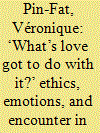

|
|
|
|
|
| Summary/Abstract |
By paying attention to love, this article offers a grammatical reading of International Relations’ founding grammar of inside/outside as an ethics of encounter. The decision to focus on love is, I suggest, to contend with the possibility that IR may express a lethal politics and ethics. I seek to substantiate this claim through an unsettling reading of neo-Jamesian contributions to the emotional turn. I conclude that the discipline’s founding grammar is an ‘avoidance of love’ and offer a reminder that an alternative way of loving is possible.
|
|
|
|
|
|
|
|
|
|
|
|
|
|
|
|
| 2 |
ID:
138088
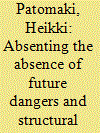

|
|
|
|
|
| Summary/Abstract |
One of the great appeals of securitization theory, and a major reason for its success, has been its usefulness as a tool for empirical research: an analytic framework capable of practical application. However, the development of securitization has raised several criticisms, the most important of which concern the nature of securitization theory. In fact, the appropriate methods, the research puzzles and type of evidence accepted all derive to a great extent from the kind of theory scholars bequeath their faith to. This Forum addresses the following questions: What type of theory (if any) is securitization? How many kinds of theories of securitization do we have? How can the differences between theories of securitization be drawn? What is the status of exceptionalism within securitization theories, and what difference does it make to their understandings of the relationship between security and politics? Finally, if securitization commands that leaders act now before it is too late, what status has temporality therein? Is temporality enabling securitization to absorb risk analysis or does it expose its inherent theoretical limits?
|
|
|
|
|
|
|
|
|
|
|
|
|
|
|
|
| 3 |
ID:
152109
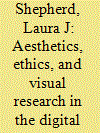

|
|
|
|
|
| Summary/Abstract |
Fifteen years ago, Roland Bleiker’s profound and influential article outlined a research agenda for those who take seriously the nature of aesthetic encounters with the social world. A rich and sophisticated literature addressing theoretical and methodological aspects of visual research in IR has emerged through the ‘aesthetic turn’ in International Relations (IR) theory.1 Efforts to theorise, or represent, global politics that are inspired by an aesthetic approach do not seek to produce the ‘most accurate’ theory or representation. ‘Approaching the study of IR with an aesthetic sensibility encourages scholars to pay analytical attention to affect rather than reason, judgement rather than fact, sensation rather than intellectualism’.
|
|
|
|
|
|
|
|
|
|
|
|
|
|
|
|
| 4 |
ID:
131510
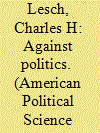

|
|
|
|
|
| Publication |
2014.
|
| Summary/Abstract |
Is politics compatible with the moral life? Recent attempts to revivify democracy have stressed the lived experience of political activity, the democratic character of the spontaneous moment and the popular movement. This article raises some concerns about such agonistic enthusiasm via an original reading of Walter Benjamin's political thought. For Benjamin, politics corrodes our everyday lives and moral conduct. His response is to envision a space for ethics wholly apart from the violence (Gewalt) that sustains propertied political order, a purified version of the Kantian kingdom of ends that he calls the "state of justice." Yet deprived of the coercive instrumentality of politics, there is no action that could lead humanity directly to such a state. To surmount this paradox, Benjamin culls from sources in Jewish political theology, and in particular, Jewish ideas about justice and the community of the righteous. In so doing, he offers a new and radical ethical critique of politics that may hold special relevance in our politics-saturated age.
|
|
|
|
|
|
|
|
|
|
|
|
|
|
|
|
| 5 |
ID:
180801
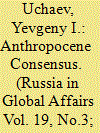

|
|
|
|
|
| Summary/Abstract |
Humanity is facing the highest risk of global existential catastrophe in its
history. What should be done to ensure effective international cooperation
for the sustainable survival of humankind? The article posits that the main
obstacles to international cooperation lie in the field of ideas and mentality.
To overcome these obstacles, a new unifying metanarrative is proposed,
the Anthropocene consensus. It means taking human survival not just as
a goal or interest, but as an ethical Absolute, which serves as a reference
point for assessing all other value systems. Since different forms of social
organization, including at the international level, are unequal in terms
of their impact on the prospects for human survival, the Anthropocene
consensus implies certain principles of the global socio-political order: a
non-absolute nature of sovereignty, a dialogue of countries with different
political regimes, justice, and the priority of global security over national
security. The conclusion suggests that the Anthropocene consensus has a
reasonable chance of theoretical and practical success.
|
|
|
|
|
|
|
|
|
|
|
|
|
|
|
|
| 6 |
ID:
165050
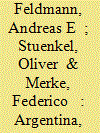

|
|
|
|
|
| Summary/Abstract |
This article examines the role of Argentina, Brazil and Chile (the ‘ABC countries’) in supporting democracy through the logic of consequences and appropriateness in three emblematic cases: the removal of President Zelaya in Honduras in 2009, the constitutional crisis that led to the removal of President Fernando Lugo in Paraguay 2012 and the sudden closing of the National Assembly in Venezuela in 2017. The authors argue that the ABC governments’ responses to governance crises have been shaped by a mixture of motivations, both instrumental (geopolitical interest or ideological affinity) and ideational (a normative preference for democracy). This mixture has resulted in inconsistent policies deriving from the mismatch between the normative commitments made by these countries, enshrined in multilateral instruments such as democracy clauses, which have often limited their room for manoeuvre, and their preference for a measured, prudent foreign policy based upon traditional principles of non-intervention. Specifically, the authors find that the ABC countries’ stance on democracy support depends on two fundamental conditions: their leverage vis-à-vis the target state and the degree of certainty regarding a potential resolution of a given democratic crisis.
|
|
|
|
|
|
|
|
|
|
|
|
|
|
|
|
| 7 |
ID:
121647
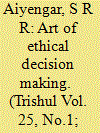

|
|
|
| 8 |
ID:
120592


|
|
|
|
|
| Publication |
Virginia, Marine Corps University Press, 2012.
|
| Description |
x, 479p.Pbk
|
| Standard Number |
9780160913686
|
|
|
|
|
|
|
|
|
|
|
|
Copies: C:1/I:0,R:0,Q:0
Circulation
| Accession# | Call# | Current Location | Status | Policy | Location |
| 057327 | 355.33041/CON 057327 | Main | On Shelf | General | |
|
|
|
|
| 9 |
ID:
086296
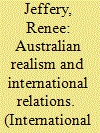

|
|
|
|
|
| Publication |
2008.
|
| Summary/Abstract |
John Anderson, Professor of Philosophy at the University of Sydney from 1927 to 1958, is not conventionally viewed as having exerted a significant influence on the development of international relations in the 20th century. Indeed, his contributions to philosophical realism and public debate in Australian society have been more readily acknowledged as his major spheres of influence. However, Anderson must also be credited with having exerted a significant influence on the intellectual development of one of the most prominent international relations theorists of the 20th century, his student Hedley Bull. With this in mind, this article assesses the impact of Anderson's teachings on Bull's thought and argues that although Bull deviated from his earliest mentor's more extreme views about ethical inquiry, his general approach to the study of international relations, understanding of international society, and sceptical attitude towards religion can, in large part, be derived from Anderson's teachings.
|
|
|
|
|
|
|
|
|
|
|
|
|
|
|
|
| 10 |
ID:
165238


|
|
|
|
|
| Summary/Abstract |
Through bringing history into conversation with ethnography, this paper re-examines scholarly understandings of Hindu nationalism and the practice of seva (service). Whereas much scholarship addresses Hindu nationalist service through a secular-liberal register, this paper considers what this language excludes. Giving critical attention to elite activists within the Hindu nationalist-led Vanavasi Kalyan Kendra (Tribal Welfare Centre), in Jharkhand, India, my research demonstrates how elite activists translate service into a religious language of somatic representation. This constructs marginal agents as passive subjects of a heavily moralistic ethical-self making project. This critical analysis opens up for study the differing ritual-politics of caste and gender which underlie the participation of marginal actors, practices which are not reducible to a discourse of religion or a universal category of acts. In order to grasp these more complex models, this paper gives importance to the ways in which its ethical discourses are inhabited in manifold ways. This tells a story of how Western models of religion are parochialized, and challenges the relationship between authority and agency which permeate our imagination of non-liberal discourses like those invoked by Hindu nationalist service projects.
|
|
|
|
|
|
|
|
|
|
|
|
|
|
|
|
| 11 |
ID:
100678
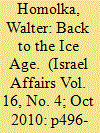

|
|
|
|
|
| Publication |
2010.
|
| Summary/Abstract |
Until well into the twentieth century, Jews and Christians had no mutual basis for discourse. The Christian-Jewish dialogue and the rapprochement between the Holy See and the State of Israel are owed in essence to feelings of shame regarding the Shoah. The Second Vatican Council and the pontificate of John Paul II signified substantial breakthroughs. Since then, though, the sense of guilt has eased, and the Roman Catholic Church's awareness of the injustice of its role as fellow traveller to, and henchman of, the Third Reich has diminished. Under the current Pope, Benedict XVI, the relationship between Jews and Catholics has noticeably deteriorated. After five years of his pontificate, Joseph Ratzinger has lost a great deal of trust, and not only among Jews.
|
|
|
|
|
|
|
|
|
|
|
|
|
|
|
|
| 12 |
ID:
189654
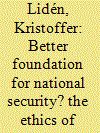

|
|
|
|
|
| Summary/Abstract |
Aiming at analysing all major security risks to a country, comprehensive National Risk Assessments (NRAs) can be used as a foundation for national security policies. Doing so manifests a modernist dream of securing societies through the anticipatory governance of risks. Yet, this dream resembles a nightmare of undemocratic state control in the name of security. Based on a critique of the politics of NRAs, this article offers a theoretical framework for evaluating their scientific and political credentials. Drawing on political theory of technocratic expert rule, ethical criteria of epistemic reliability and political representation are introduced to the debate. These criteria are then applied to an analysis of the NRAs of Sweden, Denmark, Finland, Norway and Iceland. I argue that although these NRAs are convincing correctives to the risk perceptions of politicians and civil society, they are insufficiently reliable and representative for defining the scope and priorities of national security policies at large.
|
|
|
|
|
|
|
|
|
|
|
|
|
|
|
|
| 13 |
ID:
079473
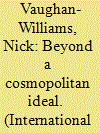

|
|
|
|
|
| Publication |
2007.
|
| Summary/Abstract |
The aim of this paper is to explore alternative ways of thinking about ethics in world politics beyond the polis, the cosmopolis, and this tired and totalising dichotomy. However, conventional forms of political criticism are said to be inadequate to the task because the dominant theories, logics and categories through which the 'beyond' might be formulated tend to be contaminated by this very dichotomy. Therefore, drawing chiefly on the insights of Jacques Derrida and Jean-Luc Nancy, I argue that new imaginaries are required. In particular, I suggest that the concept of singularity offers theorists of international politics an alternative site around which the realm of the ethico-political may be re-conceptualised.
|
|
|
|
|
|
|
|
|
|
|
|
|
|
|
|
| 14 |
ID:
081493
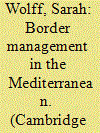

|
|
|
|
|
| Publication |
2008.
|
| Summary/Abstract |
Framed in the Justice and Home Affairs external dimension (JHAE) literature that argues that the European Union's (EU) internal security has become an objective of European foreign policy, this article offers an analysis of the institutionalization of border management in the Mediterranean. Investigating the role of Frontex, the European border management agency, this article reveals that border management in the Mediterranean is a fragmented policy that presents internal and external challenges. First, at an internal level, border management remains a sensitive issue where the principles of burden sharing and solidarity between EU member states are difficult to operationalize. Second, at an external level, effective border management is dependent on cooperation with EU's neighbours, as the Spanish-Moroccan case demonstrates. Lastly, along with these internal and external challenges, border management raises some crucial issues about the opportunity of externalizing surveillance technologies to authoritarian regimes
|
|
|
|
|
|
|
|
|
|
|
|
|
|
|
|
| 15 |
ID:
169997
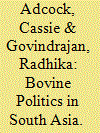

|
|
|
|
|
| Summary/Abstract |
This introduction outlines how the essays in this special section contribute to scholarship on cow protection in India. It argues that they disrupt three powerful framing binaries—religion/economy, legality/illegality and cow-lover/cow-killer—that have tended to dominate the literature on cow protection. Making tangible the analytical limits of these categories, the essays find new critical leverage in the everyday situated relationships between humans, bovines and the state. The essays are distinguished by their attention to bovines as creative and productive forces that are not mere symbols for human politics, but materially embodied and agentive beings that play a significant role in shaping the social and political worlds which emerge around them.
|
|
|
|
|
|
|
|
|
|
|
|
|
|
|
|
| 16 |
ID:
170399
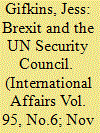

|
|
|
|
|
| Summary/Abstract |
The United Kingdom's decision to leave the European Union has ramifications beyond the UK and the EU. This article analyses the impact of the Brexit referendum on the UK's political capital in the United Nations Security Council; a dimension of Brexit that has received little attention thus far. Drawing on extensive elite interviews we show that the UK has considerable political capital in the Council, where it is seen as one of the most effective actors, but the reputational costs of Brexit are tarnishing this image. With case-studies on the UK's role in Somalia and Yemen we show how the UK has been able to further its interests with dual roles in the EU and Security Council, and the risks posed by tensions between trade and human rights after Brexit. We also analyse what it takes to be influential within the Security Council and argue that more attention should be paid to the practices of diplomacy. Influence is gained via penholding, strong diplomatic skill and a well-regarded UN permanent representative. The UK accrues political capital as a leader on the humanitarian and human rights side of the Council's agenda, but this reputation is at risk as it exits the EU.
|
|
|
|
|
|
|
|
|
|
|
|
|
|
|
|
| 17 |
ID:
175713
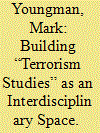

|
|
|
|
|
| Summary/Abstract |
Over the years, there have been many debates regarding the state of research into terrorism and whether “terrorism studies” constitutes an academic discipline in its own right. Such reflections, coupled with the natural evolution of what is still a relatively new area of research, have arguably led to significant improvements in quality and rigour. At the same time, the status of terrorism studies itself remains somewhat ambiguous: it is both discussed as a distinct field and simultaneously evades criticism by pointing to the difficulties of defining its boundaries. There are undoubtedly a number of advantages to forming a separate discipline, which would go some way to helping the field address some of the recurring problems that terrorism research faces. However, this article ultimately argues that scholars are better served by deliberately moving in the other direction and developing the field as a space for interdisciplinary engagement.
|
|
|
|
|
|
|
|
|
|
|
|
|
|
|
|
| 18 |
ID:
121818
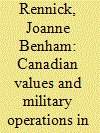

|
|
|
|
|
| Publication |
2013.
|
| Summary/Abstract |
Whereas traditionally religion has played a central role in shaping the shared values in a society, secularization, privatization of religion, and pluralism are changing the values that personnel bring to the Canadian Forces. This late modern reality means that many people who have rejected traditional forms of religion in order to interpret their personal spiritual beliefs for themselves are uncertain about their core values. Differences in values among military personnel are further complicated by the realities of modern military engagements that require a greater need for ethical thinking and moral decision making. This article examines the nature of religion and values in late modern Canadian society and identifies religious leadership as a source of moral and ethical direction as well as consolation in the face of moral anomie. Finally, it highlights the need for greater education about the role of religion and values for military personnel.
|
|
|
|
|
|
|
|
|
|
|
|
|
|
|
|
| 19 |
ID:
169336
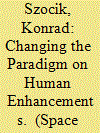

|
|
|
|
|
| Summary/Abstract |
Among the greatest obstacles to the implementation of crewed space missions are human biological limitations. Difficulties were always envisioned in relation to both Earth's moon and Mars but more so for Mars because long spaceflights would also expose crew to prolonged microgravity conditions, in addition to radiation. The result could well be osteoporosis, bone fractures, and disability. In this article, we do not contest the validity of bone loss studies. Rather, we question a seemingly tacit assumption about the immutability of human nature. Indeed, new, invasive, and noninvasive techniques of human enhancement already allow humans to enjoy modifications that will enable lengthy space missions. The alteration of human DNA has not only aided cancer patients but, for example, by using the CRISPR/Cas9 genome editing procedure, can also help to prevent damage to limbs and joints that a prolonged Mars mission could cause for the crew. Possible ethical objections to this solution are discussed, and trade-offs between risks and benefits outlined.
|
|
|
|
|
|
|
|
|
|
|
|
|
|
|
|
| 20 |
ID:
087583
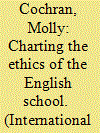

|
|
|
|
|
| Publication |
2009.
|
| Summary/Abstract |
This article aims to advance our understanding of the development of English School thinking on international ethics by outlining three phases of ethical inquiry within the British Committee. The article argues that, throughout the life of the Committee, its outlook was conditioned by a pervading moral skepticism, which was reflected in the School's commitment to a "middle-ground ethics"; however, at various times the Committee members' views changed about how maximalist the "good" could be that oriented this ethical position. Awareness of this ebb and flow helps us better understand Hedley Bull's characterization of the ethics of pluralism and solidarism within the School as well as the precise challenge contemporary English School theorists face if they are to move beyond the normative cul-de-sac that British Committee members encountered in each phase of their ethical discussions.
|
|
|
|
|
|
|
|
|
|
|
|
|
|
|
|
|
|
|
|
|